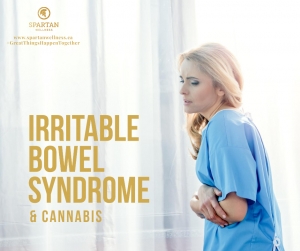Irritable Bowel Syndrome (IBS) & Cannabis
Irritable Bowel Syndrome (IBS)
 IBS is a common and chronic health issue affecting the large intestine and is characterized into three sub-types; IBS with predominant constipation, predominant diarrhea, or a combination of both. Symptoms also include abdominal cramps/pain/bloating, excess gas, and mucus in the stool. Although the precise cause of Irritable Bowel Syndrome is unknown, IBS involves problems with moving digested food through the intestines and how the brain interprets messages from the intestinal nerves, infection, weak intestinal contractions, intestinal inflammation, changes to the gut flora, abnormalities in the intestinal nerves, and so forth.
IBS is a common and chronic health issue affecting the large intestine and is characterized into three sub-types; IBS with predominant constipation, predominant diarrhea, or a combination of both. Symptoms also include abdominal cramps/pain/bloating, excess gas, and mucus in the stool. Although the precise cause of Irritable Bowel Syndrome is unknown, IBS involves problems with moving digested food through the intestines and how the brain interprets messages from the intestinal nerves, infection, weak intestinal contractions, intestinal inflammation, changes to the gut flora, abnormalities in the intestinal nerves, and so forth.
Triggers can include hormones (women are twice as likely to develop IBS), stress (may aggravate IBS symptoms but is NOT the cause), and food (can be worsened with consumption of dairy products, beans, wheat, citrus fruits, carbonated drinks, etc).
It might be interesting to learn that we have cannabinoid chemicals within our bodies as part of our endocannabinoid system. The system is not perfectly understood, but we know that it consists of cannabinoid receptors and endocannabinoid chemicals.
The receptors are located all throughout our central and peripheral nervous systems, and a large number of them are also located within our digestive system, which has led scientists to investigate ways to use them to help with conditions like Crohn’s disease, ulcerative colitis, and peptic ulcer disease.
Approximately 18% of Canadians have IBS yet, only about ½ have been diagnosed by their primary care provider (PCP). For many, it can take several years before receiving a definitive diagnosis of Irritable Bowel Syndrome. As a result, people may develop and experience mood changes related to anxiety, fatigue, embarrassment, self-consciousness, and depression. In turn, this can lead to interpersonal conflict, limit time spent with family and friends, and negatively affect work performance.
The ROME IV Diagnostic Criteria for IBS is used primarily by PCPs to help with the diagnosis of IBS. Risk factors include family history of IBS, being female, younger than 50 years old, and existing mental health problems. Long term complications can lead to hemorrhoids, diarrhea, chronic constipation, mood disorders, and overall poor quality of life.
If you think you suffer from Irritable Bowel Syndrome, and would like to speak with one of our physicians regarding medical cannabis therapy please visit www.spartanwellness.ca and fill out the interest form and one of our staff will be in contact with in 24-48 hours.
Additional info:
Canadian Digestive Health Foundation (https://cdhf.ca/)
Irritable Bowel Syndrome Self Help and Support Group (https://www.ibsgroup.org/)
The Mayo Clinic (https://www.mayoclinic.org/diseases-conditions/irritable-bowel-syndrome/symptoms-causes/syc-20360016)
Mount Sinai Hospital Toronto (http://www.mountsinai.on.ca/care/fammed/patient-resources/nutrition/irritable-bowel-syndrome-ibs.pdf/view)
National institute of Diabetes and Digestive and Kidney Diseases (https://www.niddk.nih.gov/health-information/digestive-diseases/irritable-bowel-syndrome)
https://www.verywellhealth.com/medical-marijuana-for-ibs-4115436
Spartan Wellness Newsletter
FEATURED
Location
500-1000 Innovation Dr.
Kanata, ON,
K2K 3E7

